
A 12-year-old girl was misdiagnosed with alopecia areata but actually had a nevus sebaceus with a genetic mutation.
 January 2023 in “Frontiers in bioscience”
January 2023 in “Frontiers in bioscience” Artemis protein may help control hair growth and health by influencing cell processes.
 January 2022 in “Journal of Skin and Stem Cell”
January 2022 in “Journal of Skin and Stem Cell” Trichodynia is a painful scalp condition needing targeted treatments beyond symptom management.

Changes in skin bacteria can affect hair loss and new treatments targeting these bacteria may prevent balding without sexual side effects.
 14 citations,
March 2017 in “Brain research”
14 citations,
March 2017 in “Brain research” Progesterone and its byproducts control a specific receptor in the brain independently of progesterone receptors, affecting conditions related to the menstrual cycle.
2 citations,
May 2020 in “The journal of investigative dermatology/Journal of investigative dermatology” A TP63 gene mutation causes significant hair loss and mild skin, nail, and tooth abnormalities.
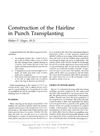 2 citations,
January 1985 in “Facial Plastic Surgery”
2 citations,
January 1985 in “Facial Plastic Surgery” The paper concludes that for natural-looking hair restoration, it's important to create an irregular hairline, use appropriately sized and angled grafts, and ensure a snug fit between grafts and recipient sites.
 89 citations,
May 1999 in “Allergy”
89 citations,
May 1999 in “Allergy” The yeast Pityrosporum ovale can cause skin allergies and infections, and antifungal treatments like ketoconazole are effective against it.
 41 citations,
November 2003 in “Annals of the New York Academy of Sciences”
41 citations,
November 2003 in “Annals of the New York Academy of Sciences” Male hormones, or androgens, affect women's health in areas like mood and bone density, and hormone replacement therapy using antiandrogenic progestogens can improve mood disorders and alertness in menopausal women.
 19 citations,
October 1985 in “British Journal of Dermatology”
19 citations,
October 1985 in “British Journal of Dermatology” The document concludes that unruly hair can be congenital or acquired, often lacks specific treatments, and can be managed with oils and short hairstyles.
16 citations,
September 2015 in “International Journal of Molecular Sciences” A specific gene variant causes severe skin issues and increases infection risk, requiring careful medical monitoring.
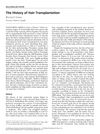 15 citations,
March 2000 in “Dermatologic Surgery”
15 citations,
March 2000 in “Dermatologic Surgery” Hair transplantation has evolved since 1822, with significant advancements by key figures and widespread international growth.
 15 citations,
January 1971 in “Journal of animal science/Journal of animal science ... and ASAS reference compendium”
15 citations,
January 1971 in “Journal of animal science/Journal of animal science ... and ASAS reference compendium” Hair analysis can't determine ponies' calcium and phosphorus levels; use soil and feed tests instead.
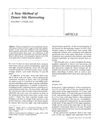 8 citations,
July 1984 in “The Journal of Dermatologic Surgery and Oncology”
8 citations,
July 1984 in “The Journal of Dermatologic Surgery and Oncology” A new suturing technique for hair transplant donor sites leads to better scarring and allows more grafts to be taken.
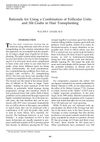 3 citations,
June 2001 in “International Journal of Cosmetic Surgery and Aesthetic Dermatology”
3 citations,
June 2001 in “International Journal of Cosmetic Surgery and Aesthetic Dermatology” Using both follicular units and slit grafts for hair transplants may give better hair density and graft survival.
 2 citations,
November 2019 in “Cancer reports”
2 citations,
November 2019 in “Cancer reports” The Wnt signaling pathway is not a major factor in the development of keratoacanthoma, a type of skin tumor.
 May 2024 in “JCI insight”
May 2024 in “JCI insight” A variant in the ADAM17 gene causes hair loss by increasing protein degradation through TRIM47.
 September 2023 in “International journal of Unani and integrative medicine”
September 2023 in “International journal of Unani and integrative medicine” Hair loss patterns are linked to temperament and can help diagnose it.
 March 2016 in “Aktualʹnì pitannâ farmacevtičnoï ì medičnoï nauki ta praktiki”
March 2016 in “Aktualʹnì pitannâ farmacevtičnoï ì medičnoï nauki ta praktiki” The shampoo with minoxidil maintains its consistency well and spreads evenly on the scalp.
 119 citations,
November 2014 in “Trends in Cell Biology”
119 citations,
November 2014 in “Trends in Cell Biology” Fibroblast growth factor receptor signaling controls cell development and repair, and its malfunction can cause disorders and cancer, but it also offers potential for targeted therapies.
 8 citations,
March 1994 in “The American Journal of Cosmetic Surgery”
8 citations,
March 1994 in “The American Journal of Cosmetic Surgery” The Total Excision Techniques improve hair transplant results by increasing grafts by at least 50% and reducing scarring.
 April 2023 in “Journal of Investigative Dermatology”
April 2023 in “Journal of Investigative Dermatology” Both laser treatments improved acne scars similarly, but the Nd:YAG laser was safer and less painful, while the Er:YAG laser left patients slightly more satisfied.
 April 2018 in “bioRxiv (Cold Spring Harbor Laboratory)”
April 2018 in “bioRxiv (Cold Spring Harbor Laboratory)” A gene variant causes patched hair loss in mice, similar to alopecia areata in humans.

The book details advanced techniques in cosmetic dermatology for experienced surgeons.
8 citations,
June 2020 in “The journal of investigative dermatology/Journal of investigative dermatology” A boy's skin fragility and sparse hair were caused by a genetic mutation affecting skin cell adhesion.
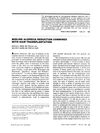 5 citations,
March 1985 in “Head & Neck Surgery”
5 citations,
March 1985 in “Head & Neck Surgery” Combining scalp reduction and hair transplants improves coverage and appearance for male baldness.
 3 citations,
June 2007 in “Journal of Cosmetic Dermatology”
3 citations,
June 2007 in “Journal of Cosmetic Dermatology” Using the right hair care products can improve hair health and help manage hair disorders.
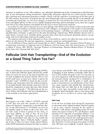 3 citations,
February 2000 in “Dermatologic Surgery”
3 citations,
February 2000 in “Dermatologic Surgery” The document concludes that hair restoration has improved with follicular unit transplantation, making it more scientific and precise.
 2 citations,
March 2023 in “European Polymer Journal”
2 citations,
March 2023 in “European Polymer Journal” The new nanofiber improves wound healing by releasing growth factors, reducing inflammation, and helping skin regeneration.
 2 citations,
August 2022 in “The journal of investigative dermatology/Journal of investigative dermatology”
2 citations,
August 2022 in “The journal of investigative dermatology/Journal of investigative dermatology” A specific mutation in the K25 gene causes a rare genetic disorder with curly hair at birth and later hair loss, along with dental issues.



























